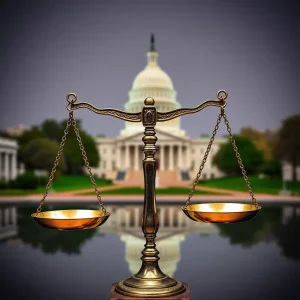U.S. Judge Rules Lakeland City Illegally Fined Woman Over Profane Political Yard Sign
Ruling Marks a Victory for First Amendment Rights
In a significant ruling this week, a Federal judge in Tennessee declared it unconstitutional for a city to impose a fine on a woman who exhibited a political sign in her yard that employed coarse language to express her disdain for both President Biden and ex-President Donald J. Trump. The citizen in question, Julie Pereira, a 40-year-old resident of Lakeland, Tenn. was penalized with hundreds of dollars by the city of Lakeland for displaying a sign that stated “Fuck Em’ Both 2024”.
A Stand Against Suppression of Free Speech
Earlier this year, Lakeland had reasoned that the political sign was in violation of its municipal code due to its obscene nature. However, in a counter claim in June, Ms. Pereira contested Lakeland’s fine in a federal court, asserting her First Amendment right to display the sign in her yard.
Judge Mark S. Norris, of the U.S. District Court in Memphis, intervened in the matter through an order issued on Tuesday. In his judgement, he concluded that Ms. Pereira’s yard sign was not obscene. Furthermore, he asserted that it was unconstitutional for Lakeland City to penalize Ms. Pereira for the sign.
Reparation and a Cease Order for the City
Judge Norris ordered Lakeland City to reimburse Ms. Pereira for nearly $700 in fines and to pay up an additional $1 in damages for infringing her First Amendment rights. Furthermore, the judge ruled in favor of Ms. Pereira, awarding her legal fees amounting up to $31,000.
Beyond dealing with repercussions for its imposition of fines, Lakeland City has also been instructed to desist from taking any further actions against Ms. Pereira. This effectively allows her to continue expressing her political viewpoints freely through signs or other means.
First Amendments Rights Upheld
This case adds to the body of legal precedents guaranteeing freedom of speech and expression in the United States. It underscores the importance of the First Amendment which safeguards individual’s rights to express their political views, even when such expressions may employ strong language or diverge from mainstream opinion.


























